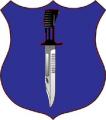Hi John,
Well, personally I LIKE fuzzy thinking, but only if we are talking about Fuzzy Set thinking

.
In many ways, my own research is at the exact opposite pole from Sam's: extremely theoretical (and philosophical). My actual focus is on "sense-making" and how people build up their perceptions of "reality" (aka mental maps, etc.). One of the biggest dangers I've found with having a focus like this is that it is way too easy to get lost inside your own head and sound not only "fuzzy" but inane / insane

.
In a lot of ways, John, I'm not trying to make any claims about "truth"; I'm trying to formalize and establish grounds and limits for such claims.
I had an interesting discussion last night about unconscious logic models (deductive, inductive, abductive) and how they are hurting the Intelligence and Security sectors. Basically, I was arguing that a lot of the problems stem from applying the wrong logic model given the "data" available (and the "data" is a problem, too), and that led into some back and forth banter on how to do professional education.







 I like your dissertation topic and, I have a suspicion that OU Press might like it too when you turn it into a book.
I like your dissertation topic and, I have a suspicion that OU Press might like it too when you turn it into a book.


 .
. .
. .
.

Bookmarks